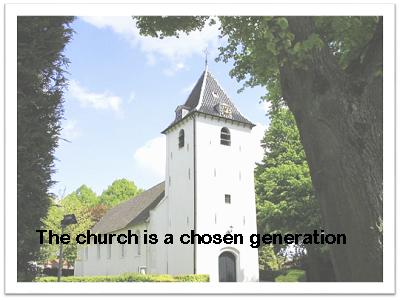Ethical Dimensions of the Lord's Prayer: Hallowed Be Thy Name
Ethical Dimensions of the Lord's Prayer: Hallowed Be Thy Name

Hallowing God's Name by living a hallowed life⤒🔗
As we learned last time, rightly knowing God (in order to glorify Him as God) is the first component of hallowing His Name.
There is a second component, according to the Heidelberg Catechism: "...further also, that we may so order and direct our whole life, thoughts, words, and actions, that Thy Name may not be blasphemed but honored and praised on our account." That's how Answer 122 ends.
Perhaps the best explanation of this biblical summary is the Bible itself. Let's study together how we are to hallow God's Name by living a hallowed life.
Being holy as God is holy←⤒🔗
For I am the LORD your God. You shall therefore consecrate yourselves, and you shall be holy, for I am holy. Neither shall you defile yourselves with any creeping thing that creeps on the earth. For I am the LORD who brings you up out of the land of Egypt, to be your God. You shall therefore be holy, for I am holy.Leviticus 11:44-45
And the LORD spoke to Moses, saying, 'Speak to all the congregation of the children of Israel, and say to them: You shall be holy, for I the LORD your God am holy.Leviticus 19:1-2
As obedient children, not conforming yourselves to the former lusts, as in your ignorance, but as He who called you is holy, you also be holy in all your conduct, because it is written, 'Be holy, for I am holy.'1 Peter 1:14-16
If any single word captures the uniqueness of God and His people, it is this word holy. Holiness denotes separation from sin, moral purity and perfection. Add to these the differentness belonging to covenantal living, the distinctiveness characterizing God's people in the world.
Be holy! God told old covenant Israel. Be holy! is the new covenant summons as well.
In 1 Peter 1:14-16 positive holiness is explained to mean living as "children of obedience," that is, as children of God whose defining quality is their obedient will. To be holy is to be obedient children. By contrast, negative holiness means not following the scheme or way of life outlined by our former desires and appetites.
It is very important to note that the apostle identifies, as the standard of our holiness, not simply "God," but the God "who called you." This "calling" refers to the summons of the gospel made effective by the Spirit, which gospel imparts to the church that very holiness to which God calls the church through the gospel! Why is this important? Because we are warned here that our holiness is a divine gift, not a human achievement. Our God-given holiness functions, then, as a starting point, not a destination.

"Be holy in all your conduct," writes the apostle, "because it is written, 'Be holy, for I am holy.'" That sounds strange, doesn't it? Rather than appealing, say, to the teaching of Jesus, or to some post-Pentecost spiritual reality, Peter quotes his Bible, reaching way back into the history of redemption, the history of the one people of God. Here we have another demonstration of the essential unity of the entire Bible regarding the way of salvation, the path of gratitude, and hence, the meaning of hallowing God's name.
More than that, these concluding words remind us that when we pray, "Hallowed be Thy Name," we also promise to live so that God's Name will be hallowed, and not blasphemed, on our account.
The Christian missionary's lifestyle←⤒🔗
Therefore, whether you eat or drink, or whatever you do, do all to the glory of God. Give no offense, either to the Jews or to the Greeks or to the church of God, just as I also please all men in all things, not seeking my own profit, but the profit of many, that they may be saved.
When we think of the Christian missionary's lifestyle, we tend to imagine the hardships of living in a strange culture, of learning a foreign language, and the like. Indeed, many of those who devote their lives to bringing the gospel of Jesus Christ to those who have not yet heard and believed it sacrifice and suffer much for the gospel's sake.
But 1 Corinthians 10:31-33 was not written to that kind of missionary. It was written to ordinary believers, church members in Corinth who were struggling with issues of applying their faith to daily life in a pagan society. As the apostle Paul wraps up his discussion of these issues, he concludes his summary exhortation by pointing his readers to the missionary objective of holy living: "that they (those living around us) may be saved."
This missionary purpose directs our daily living: "Whether you eat or drink, or whatever you do, do all to the glory of God." Soli Deo gloria, also by means of our ordinary, mundane, routine activities!
The negative explanation of glorifying God is expressed in the warning: "Give no offense, either to the Jews or to the Greeks or to the church of God." For the Corinthian believers, and for modern Christians, this means being careful to avoid leading others into sin. Responsibility for our neighbor belongs to our missionary calling. Evaluating the effects of our conduct on others, especially on fellow believers, requires that we pay attention to the impressions we give and the perception we create by our manner of life.
The apostle Paul points to himself as an example of the kind of conduct he is urging for these believers. He tries to please all men in everything. Don't misunderstand Paul to be saying that we must ingratiate ourselves to everybody who crosses our path. Rather, the apostle showed how he always looked beyond the neighbor, to point people to the Lord Jesus Christ.
Doing everything to the glory of God, so that those around us may be saved — here we have the aim and the motive of our missionary lifestyle. Thank God for people who devote their lives to carry the gospel of God's glory to remote regions. But thank God also for the believer's privilege to live out the missionary dimension of this petition of the Lord's Prayer, "Hallowed be Thy Name"!

A holy people with a missionary task←⤒🔗
But you are a chosen generation, a royal priesthood, a holy nation, His own special people, that you may proclaim the praises of Him who called you out of darkness into His marvelous light: who once were not a people but are now the people of God, who had not obtained mercy but now have obtained mercy.
What a privileged people the church is! To indicate the scope of this privilege, Peter uses four titles of honor, titles given by God Himself to His people (Ex. 19:6; Isa. 43:20b-21). These titles had been given or promised to Israel in connection with a new beginning, either Sinai or her return from captivity.
- The church is a chosen generation. By His electing love, God brought forth ("generated") His children. This means that just as Father is holy, so His children must reflect the holiness of their Father.
- The church's holiness is expressed by her priestly activities. She is a royal priesthood, a title pointing to a body of ministering servants. No believer can live by himself or serve in solitude. The church is a body of co-laborers, a priesthood.
- The church is also a holy nation, God's own possession, set apart, differentiated from all other people. Holiness is always the result or fruit of election. In this title we see that the church is an ordered, governed unity where God's Word and Spirit rule.
- Finally, believers ) together are God's own special people. God bestows upon the church special covenantal and redemptive privileges. Each of these titles points to an aspect of the church's identity which, if lived out, will constitute her missionary activity of "proclaim(ing) the praises of Him who called you out of darkness into His marvelous light." Read carefully: by living in terms of each of these titles, the church will in fact be proclaiming God's praises among men, and will thereby be exercising her missionary calling. These verses teach us that doing missions entails being this kind of church! Your congregation is truly a mission-minded church if she acts like she was brought into being, not by the will of man, but by her holy Father (a chosen generation); if she ministers together in offering the sacrifice of obedience (a royal priesthood); if she shows forth the rule and order of God's righteous holiness (a holy nation); and if she protects the unique security of belonging to the Triune God (God's own special people).

These are but a sampling of many Bible passages that connect our conduct and God's Name. Space prevents us from considering equally relevant passages concerning the consequence of David's sin with Bathsheba, about letting our light shine in the world, and about the smudging of God's reputation by the world resulting from the church's unholiness.
Pray for God's Name to be hallowed in the world and the church, by our individual and congregational behavior, by our personal lifestyle which springs from faith-obedience. Soli Deo Gloria!

Add new comment